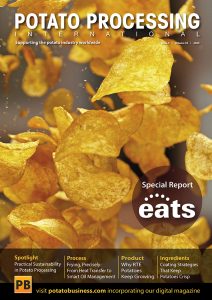Lamb Weston / Meijer publishes sustainability report

Lamb Weston / Meijer, which manufactures frozen potato products and dried potato flakes, published its third sustainability report, highlighting key results in saving direct water usage, reducing direct energy use and increasing potato utilization.
The key results show saving direct water usage by 7 percent – or 285 million liters – per year, reducing direct energy use by 21 percent per year and increasing potato utilization by 4.3 percent per year versus the 2008 baseline.
Based on these results, the company is well on track to achieve 2020 sustainability targets.
The sustainability approach focuses on six specific areas, which are most closely related to the company’s core activities. These are: Water, Energy & Emissions, Potato & Waste, Employees, Food Safety & Quality and Nutrition & Health.
The company sustains that it has made real progress towards reaching 2020 sustainability targets. For example, versus 2008 baseline it saves the equivalent of 114 Olympic swimming pools of fresh water per year; it has reduced yearly direct energy use by the equivalent of 11,000 Dutch households; and it uses now 51,600 fewer tones of potatoes to make the same finished product, greatly increasing potato utilization.
Additionally, it sends zero waste to landfill. Today, 99.7 percent of their by-products and waste streams – representing 300,000 tones of mainly potato-based materials – find a useful destination. It is also using healthier frying oils, less salt and introducing product innovations that help contribute to a product that meets current global food trends.
Bas Alblas, CEO at Lamb Weston / Meijer explains: “If we want our industry to truly be sustainable, we need to focus on the total supply chain. That’s why we believe in Creating Shared Value in everything we do. If we want to be relevant as a company over the long term, we have to collaborate with a variety of stakeholders in a number of ways. For us sustainability is a company imperative and the way we do business. We consider it our responsibility to play an active and leading role in our industry on sustainable development.’”















